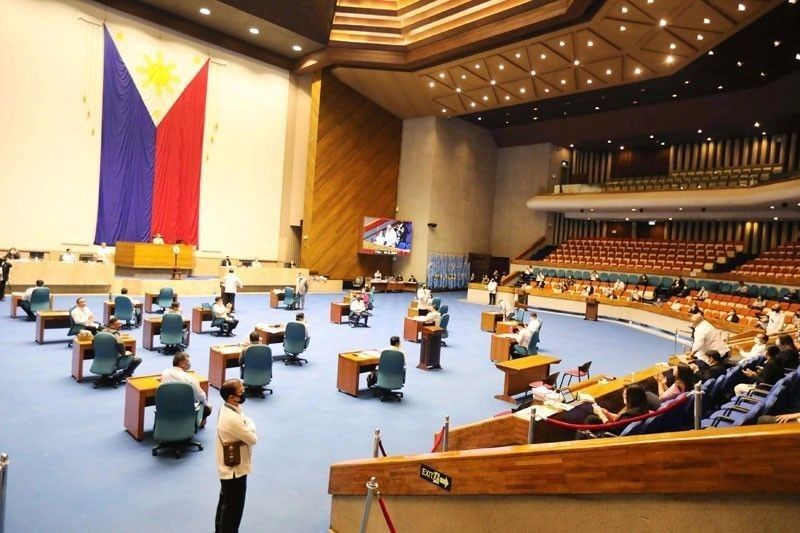Senate fails to approve extension of aid law

MANILA, Philippines — The Senate adjourned yesterday without passing the Bayanihan to Recover as One Act or the second part of the Bayanihan to Heal as One Act, meant to empower President Duterte to address the coronavirus disease 2019 (COVID-19) pandemic.
Malacañang said it is not in a hurry to pass the Bayanihan 2 Act after President Duterte did not issue a certification calling for its urgent passage, which would have facilitated the process for final approval in Congress.
“We announce that Malacañang will not certify as urgent the extension of the Bayanihan to Heal as One Act for now. Please be guided accordingly,” presidential spokesman Harry Roque said in a text message he sent to reporters around the time the Senate adjourned its session.
Congress adjourned sine die last night without approving on third and final reading the bill, replacing Republic Act 11469 or the Bayanihan to Heal as One Act, which gave Duterte special powers to address the COVID-19 crisis. RA 11469 will expire this month.
The Senate approved on Wednesday night Senate Bill 1564 or the Bayanihan to Recover as One Act, which removes the penal provision of RA 11469 and expanded financial assistance to various sectors, including to farmers, public utility drivers, teachers and those in the creative industry affected by the COVID-19 pandemic.
Earlier in the day, Roque said the Palace was not keen on calling for a special session because lawmakers gave assurance that the measure would be passed before adjournment.
Congress will resume for its second regular session on July 27 in time for the President’s State of the Nation Address.
House OKs Bayanihan 2 Act
The House of Representatives has approved on first reading the measure extending the national emergency and special powers granted to Duterte to address the COVID pandemic for three more months.
In its virtual session late Wednesday night, the chamber convened as committee of the whole and approved House Bill 6953 or the substitute bill for the proposed Bayanihan to Recover As One Act, which extends the effectivity of Republic Act 11469 (Bayanihan to Heal as One Act) until Sept. 30.
The Lower House was set to continue deliberations and pass on second reading last night the bill that seeks allocation of an additional P162 billion for the continuation of COVID-19 response measures.
Deputy Speaker LRay Villafuerte, author of the measure in the Lower House, sponsored and defended the bill on the floor.
In his sponsorship speech, the Camarines Sur representative explained that the proposed law is necessary to allow the national government to continue providing Filipinos with various forms of relief as the health crisis continues and while a vaccine remains unavailable.
“This contains similar provisions as contained in the Bayanihan To Heal As One Act. But this is a new and enhanced version — meaning we have put in improved (and) enhanced provisions that will help the economy bounce back and help our people, also the affected sectors, cope with COVID-19,” Villafuerte stressed during interpellation.
Under HB 6953, P162 billion in funds will be used to support operations and response measures to address the health crisis in addition to the P275-billion fund used under RA 11469 that was enacted last March.
This measure will also provide for the grant of P5,000 to P8,000 subsidy for low-income families, households with recently returned OFWs and no-work-no-pay individuals such as freelancers and the self-employed.
It also grants a one-month emergency subsidy to low-income households who are qualified but were not granted, such as those placed in the wait list, under the first Bayanihan Law.
Specifically, P18 billion will be allotted for the implementation of cash-for-work program and the Tulong Panghanapbuhay sa Ating Disadvantaged/Displaced Workers (TUPAD), P5 billion for the implementation of the Assistance to Individuals in Crisis Situation Program of the DWSD and P21 billion for unemployment or involuntary separation assistance to displaced workers in health, education, tourism, culture and arts, creative industry, transportation and other sectors affected by the pandemic.
There will also be P50 billion for infusion of capital to government financial institutions, P21-billion support to the agriculture sector, P21-billion assistance to the critically impacted businesses in the transportation industry and for the development of accessible sidewalks and protected bicycle lanes, P10 billion to finance tourism programs to assist impacted businesses in the tourism industry, P3-billion assistance to state universities and colleges for their transition to flexible learning modality and P1-billion assistance to Technical Education and Skills Development Authority for the development of smart campuses.
The bill also seeks to provide P12 billion for the procurement of PCR testing and extraction kits, supplies and materials for COVID-19 testing and for the enhancement of DOH capacity to provide healthcare services.
The Senate also moved to amend the Bayanihan Act to expedite the release of cash aid and make it tax-exempt after learning that not one of the hundreds of health workers who had fallen ill or died from COVID-19 had received a centavo of the compensation provided for by the law.
Senate President Pro Tempore Ralph Recto said a new provision of the Senate version of the bill extending the validity of the Bayanihan Act requires payment of compensation not later than 90 days after the date of confinement or death.
“We are imposing a deadline. Its release should not be at the mercy of red tape,” Recto said, who wrote the language of the amendments. Christina Mendez, Edu Punay
- Latest
- Trending































